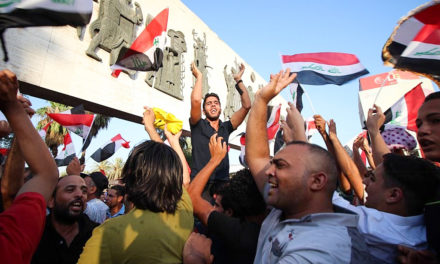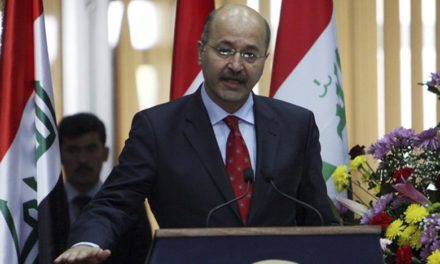(Photo: Hadi Mizban/AP)
The iconic collapse of Saddam Hussein’s statue in Firdos Square, Baghdad, was the symbol for ushering in a new democratic era for Iraq. Seventeen years later in nearby Tahrir Square, Baghdad witnessed another important step in its post-Ba’athist political development: mass protests. Thousands of Iraqis took to the streets to protest against the government and the lack of progress that they have made with respect to a number of national-level issues ranging from endemic corruption to service provision. One contentious issue that is not given much prominence in the mainstream media is electoral reform.
Iraq’s first steps onto the democratic stage was the introduction of the proportional representation (“PR”) voting system introduced by the Coalition Provisional Authority Order No 96 in 2004, a system of governance that has eluded Iraqis for years. Although this Order has since been amended, the crux of this electoral system is an open-list form of party proportional representation. Its intended purpose was to cater to Iraq’s diverse demographic which is ethnically and religiously diverse. The PR system appeared to be the best fit in light of the country’s complex socio-political landscape and was able to take into account the sectarian apportionment system (Muhasasa Ta’ifia). Although the overarching theme of this electoral system is one of inclusion, the last sixteen years has demonstrated that in implementation it is much more of a hindrance to Iraq’s political progress. This hindrance has plagued the legislative process in Iraq by creating legislative gridlock. Although the idea of a unified Council of Representatives representing Iraq’s ethnic diversity is attractive, it does not give the executive a firm mandate to implement essential laws vital to the progress of Iraq.
Electoral systems are the cogs that keep the wheels of democracy functioning properly and whilst no electoral system is perfect, there comes a time in all democracies around the world – including Iraq- to not only look at who the next leader will be, but to also consider the process and procedures by which that leader is elected. Overhauling the electoral system is an effective way of overcoming legislative gridlock. Although this was attempted in 2010 by introducing the ability for Iraqis to choose their candidates in multiple jurisdictions (which the 2005 form of the electoral system did not allow), the current system does not go far enough in giving the executive the required mandate to work with the legislature in producing, discussing, and implementing laws. The current PR system is aesthetically effective in providing a voice for the many players on Iraq’s political stage but it’s effectiveness can be questioned given that the state of the country has not dramatically changed since 2003, a sentiment echoed by the recent protests.
The next step in developing Iraq’s young democracy is through another attempt at electoral reform, but in the form of a major overhaul. By looking at consolidated democracies, such as the United Kingdom, the introduction of a pluralist voting system could be the catalyst that Iraq needs in order to start developing its legal infrastructure, which can, in turn, encourage local and international investment. Using such a system, Iraq can go on to establish an effective executive that not only has a strong electoral mandate to deliver political stability but can use this mandate to build a legislative framework that will form the foundations of economic development in Iraq.
Iraq will no doubt endure its current challenges in developing its democracy, namely in overhauling the electoral system. One of the biggest challenges will be finding a leader to champion this radical change ensuring that the inclusive spirit of Muhasasa Ta’ifia is not disrupted, while the corrosive form is altered. The intention behind introducing a new electoral system is to overcome legislative gridlock and even though Iraq has made great strides in political co-operation since 2003, there is still a lot of work that can be done in order to both strengthen the executive’s mandate and to further unify the legislature. A stronger sense of political and legislative cohesion is needed in Iraq and only once this is obtained can Iraq become more prosperous for its citizens. Further stabilising the country at large will contribute to easing the tensions in the broader Middle East.

Alex Benn-Amir
Alex Benn-Amir is a London based political commentator, independent researcher and writer concentrating on socio-political issues affecting Iraq.










